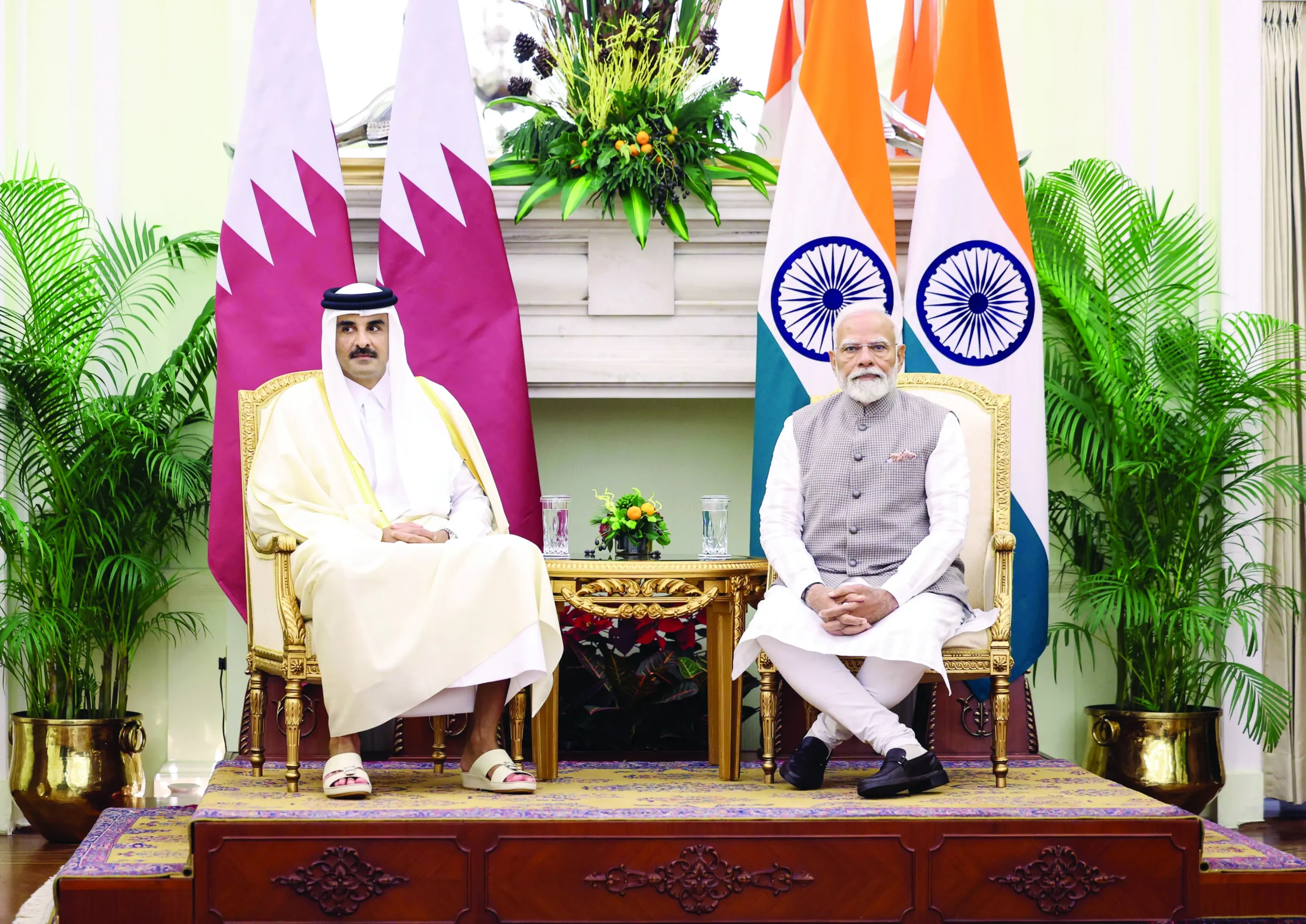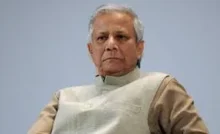In India, a visiting head of state is generally received by either a Cabinet Minister or Secretary to the Government of India. Prime Minister Narendra Modi personally receiving the Emir of Qatar, Sheikh Tamim Bin Hamad Al Thani, by breaking protocols reflects the significance of Qatar for India. Mr Al Thani’s visit to India takes place at a time when the geopolitics around the world are rapidly experiencing Trumpification.
Qatar has more than 25% or 8 lakh Indians, which is approximately more than 31% of the total non-Qataris population (85%). Such a large number of the Indian diaspora living in Qatar plays a significant role in bridging a decade-long bilateral relationship between the two countries.
Context
In the wake of Modi’s recent visit to the USA and Trump’s announcement to increase the export of LNG to India, the shifting market dynamics may have forced Mr Al Thani to schedule a state visit to India. Qatar is very much aware of the fact that India, to avoid US tariffs, might be shifting its interest from the Gulf(Qatar) to the US. Mr Al Thani also knows it very well that the Indian Foreign policy is largely guided by the interest of the Indian people, and hence, the Indian foreign policy is there to serve the Indian people first. As Qatar’s total revenue is mostly dependent on its hydrocarbon, Donald Trump’s recent announcement surfaces at a time when Qatar is already the number one import destination of LNG for India
Therefore, keeping the already declining bilateral trade volume with India ($18.7 billion in 2022-23 to $14 billion in 2023-24), Qatar has signed many agreements with India during this visit to double the bilateral Trade volume to $28 billion in the next five years.
As both countries have signed to expedite negotiations on the Bilateral Investment Treaty, Qatar’s commerce ministry has officially announced that Qatar and India are going to be the third largest trading partner soon. However, it is now going to be very interesting to see how India will be playing smart to double its bilateral trade simultaneously with the USA($500 billion) and Qatar($28 billion) in the next five years.
Qatar’s assurance of investing $10 billion in India in the next few years through Qatar Investment Authority (worth over $526 billion) is a significant mark towards promoting the Make in India initiative. In order to double the bilateral trade by 2030, both countries have agreed to enter into the Free Trade Agreement (FTA). When the world is completely embroiled in tariff wars, this initiative has given a clear message to the Trump administration that India and Qatar are against the tariff war and are rather committed to encouraging trade through the elimination of tariffs.
As per the Comprehensive Economic Partnership Agreement (CEPA), India and Qatar have agreed to aggressively focus on intellectual property rights that will possibly promote the innovation of culture between the two countries in the future. Under CEPA, this bilateral agreement has additionally the potential to mobilise labour mobility from India to Qatar.
Union Commerce and Industry Minister Piyush Goyal also said during the meeting, “We are now looking at a new future where we will transition from energy being the hallmark of our trade to new age technologies, whether it is Artificial Intelligence, Internet of Things, Quantum Computing, or semiconductors.” This is a clear message to even Qatar that India is not only going to import hydrocarbon from Qatar, but India would also be exporting what it is good at. Rather than just emptying its treasury in the purchase of oil and gas from Qatar, India is also planning to showcase and export its tech strength to Qatar. Doing so would not just promote the expansion of Indian goods and services in Qatar but also help India trade off a significant amount of import values with Qatar. As India is approaching Vision 2047, its objective is not only to fulfil its energy needs but also to project its Vision of Vikshit Bharat. For that matter, India needs to work more on reducing its overall Current Account Deficit(CAD) by becoming an export-oriented country as soon as possible. In this scenario, it would not be wrong to assume that the FTA under CEPA will strategically and largely go in favour of India, as India is an emerging nation in the field of tech industries.
While PM Modi welcomed the Qatar National Bank’s expansion in India with the establishment of an office in GIFT City, Mr Al Thani has also ensured the nationwide implementation of UPI services in Qatar soon. When the UPI services are fully under process in Kuwait after UAE, the recent bilateral talk between Emir Al Thani and PM Modi has ensured that Qatar will be the next destination of India’s digital payment system, UPI, in the Gulf.
Both countries aim to double their trade to $28 billion by 2030. Once India’s proposed UPI services are fully implemented in Qatar, both countries will have the option to switch to smoothly trade in local currencies. This step will certainly help India and Qatar to reduce their reliance on the dollar in the future.
India’s strengthening relationship with Qatar may provide an added advantage to India to keep track of the unfolding geopolitical dynamic in the region. Furthermore, as India, in recent times, continues to deepen its bilateral relations with Kuwait, Iran and the Taliban, Qatar, sitting on one of the most important choke points in the Persian Gulf, will exponentially boost India’s geopolitical significance in the region, as both the countries have also signed an intelligence-sharing framework during this visit.
In contemporary times, many refer to Qatar as a deal country where several deals can frequently be seen taking place. Qatar, being one of the most important players in the Middle East, shares strong relations with not just the USA but almost all other countries located in that region. Engaging with Qatar will not just help India fulfil its energy needs but also provide an opportunity to diplomatically connect with many countries around the globe, primarily the Middle Eastern countries. Therefore, the deepening ties with Qatar is a win-win situation for India in every dimension.
Geopolitics of Hydrocarbon
As Israel is gaining momentum in post-Assad West Asia, gradually creating an image of a net security provider in the region, Donald Trump’s venture into the hydrocarbon market can also be seen as a step towards weakening the anti-Israeli countries in the region. As the Middle East’s economy significantly depends on the oil and gas market, the resource-rich USA’s venture into this market will bring a significant geopolitical shift in the region. This step seems to be paving the way for Israel to further strengthen its geopolitical stronghold in the region.
Sanjay Turi, Doctoral Candidate, Centre for West Asian Studies(CWAS), School of International Studies(SIS), Jawaharlal Nehru University, New Delhi.




